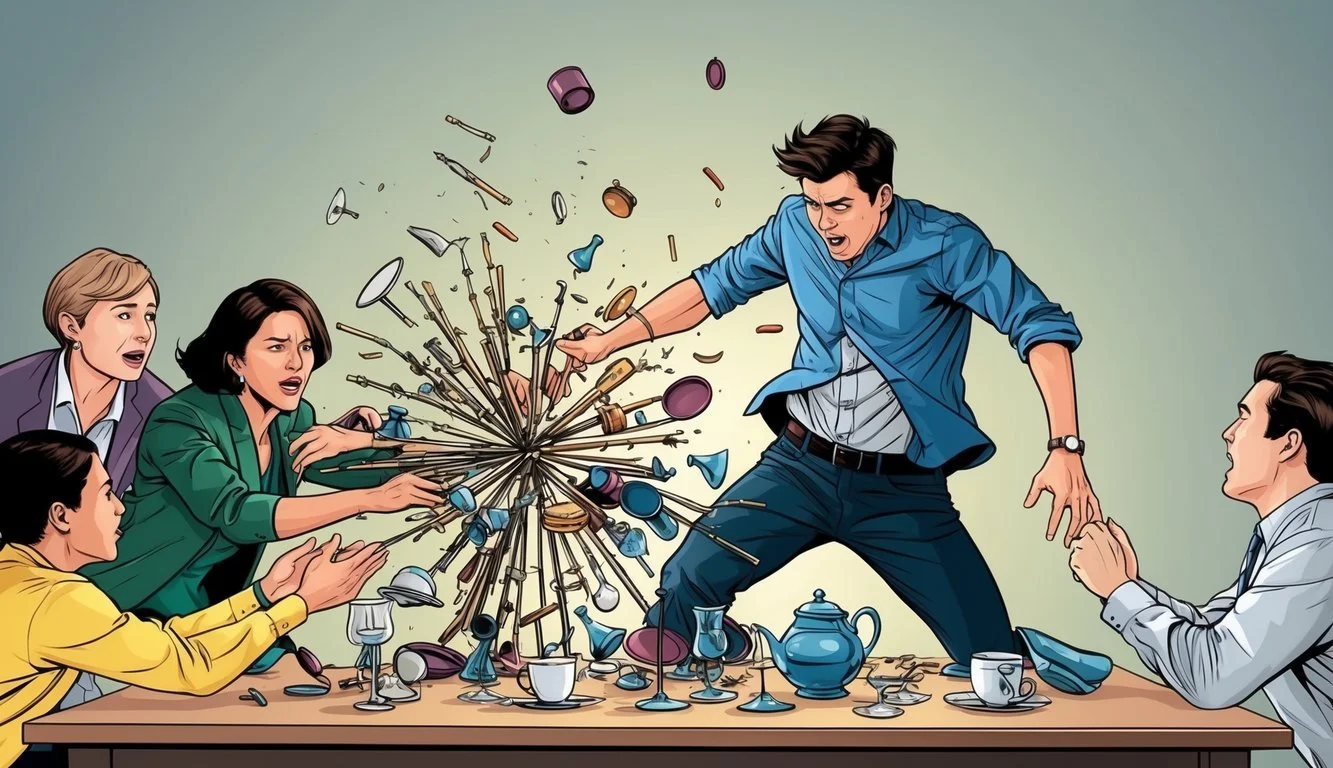Impulsivity in Love: How It Affects Relationships and What You Can Do
Impulsivity can profoundly impact romantic relationships, often in ways that couples may not initially realize. While spontaneity can add excitement, unchecked impulsive behaviors frequently lead to misunderstandings, conflicts, and erosion of trust between partners. Impulsive actions like sending angry text messages, making rash decisions, or engaging in infidelity can severely damage the foundations of intimacy and mutual respect that healthy relationships require.
Recognizing impulsive tendencies is an important first step for individuals and couples seeking to improve their relationship dynamics. By developing greater self-awareness around impulsive urges, partners can work on healthier communication strategies and more thoughtful approaches to decision-making. This allows for stronger bonds built on consideration and emotional maturity rather than reactivity.
Addressing impulsivity in relationships often involves developing skills like pausing before reacting, considering potential consequences, and discussing important matters calmly. While changing ingrained behavior patterns takes effort, the rewards of more stable and fulfilling partnerships make it a worthwhile endeavor for many couples. With conscious effort, impulsive tendencies can be channeled into positive spontaneity that enhances rather than undermines relationship satisfaction.
Understanding Impulsivity
Impulsivity is a complex behavioral trait that can significantly impact relationships. It involves acting without forethought and often leads to unintended consequences.
Definition and Scope
Impulsivity refers to the tendency to act quickly without considering potential outcomes. It manifests as rash decision-making, difficulty delaying gratification, and a lack of inhibition. In relationships, impulsive behaviors may include:
• Sudden outbursts of anger • Making major decisions without consultation • Engaging in risky sexual behavior • Impulsive spending or gambling
These actions can strain trust and create instability in partnerships. Impulsivity exists on a spectrum, ranging from occasional spontaneity to more problematic patterns that interfere with daily functioning and interpersonal connections.
The Neuroscience of Impulsivity
The brain's prefrontal cortex plays a crucial role in impulse control. This area is responsible for executive functions like planning, decision-making, and self-regulation. In impulsive individuals, there may be:
• Reduced activity in the prefrontal cortex • Heightened sensitivity in reward centers • Imbalances in neurotransmitters like dopamine and serotonin
Neuroimaging studies have shown differences in brain structure and function among those with high impulsivity. These variations can affect how individuals process information and respond to stimuli in their environment.
Genetic factors also contribute to impulsivity. Certain genes influence neurotransmitter systems, potentially predisposing some people to more impulsive tendencies.
Impulsivity in Relationships
Impulsivity can profoundly shape relationship dynamics across various contexts. It influences how people interact, make decisions, and respond to challenges in their personal and professional lives.
Romantic Partnerships
Impulsive behavior often leads to spontaneous gestures in romantic relationships. These can range from surprise gifts to impromptu trips, adding excitement and unpredictability. However, impulsivity can also result in hasty decisions that strain the partnership.
Couples may struggle with financial stability when one partner makes impulsive purchases. This can create tension and disagreements over money management.
Communication is another area affected by impulsivity. Partners might blurt out hurtful comments without thinking, damaging trust and emotional intimacy. Conversely, impulsive declarations of love can intensify romantic feelings.
Conflict resolution becomes challenging when impulsive reactions overshadow thoughtful responses. This may lead to escalated arguments and difficulty in finding constructive solutions.
Family Dynamics
Within families, impulsivity can create both positive and negative outcomes. Impulsive parents might organize spontaneous family outings, fostering fun memories and bonding experiences.
On the flip side, impulsive decision-making can disrupt family routines and stability. Children may struggle with inconsistent rules or sudden changes in plans.
Sibling relationships are also influenced by impulsivity. Quick-tempered reactions can lead to frequent arguments and physical altercations between siblings.
Impulsive behavior in adolescents often causes friction with parents. Teens might engage in risky activities without considering consequences, leading to family conflicts and parental worry.
Friendships
Impulsivity in friendships can create exciting and memorable experiences. Friends who act on sudden ideas might embark on adventures or try new activities together.
However, impulsive actions can also strain friendships. Canceling plans at the last minute or making thoughtless comments can hurt feelings and erode trust.
Impulsive individuals might struggle with maintaining long-term friendships. They may jump from one social group to another, seeking novelty and excitement.
Loyalty can be tested when impulsive friends share secrets without thinking or make rash judgments about others in the social circle.
Workplace Interactions
In professional settings, impulsivity can spark creativity and innovation. Employees who act on sudden ideas might propose unique solutions to problems.
However, impulsive behavior can also lead to rash decisions that negatively impact team dynamics. Speaking out of turn in meetings or changing project directions without consultation can frustrate colleagues.
Impulsive managers might struggle with consistent leadership. Their unpredictable behavior can create an unstable work environment and lower employee morale.
Career progression can be affected by impulsivity. Making hasty job changes or impulsive remarks to superiors might hinder professional growth and opportunities.
Consequences of Impulsivity
Impulsivity can profoundly impact relationships, leading to several negative outcomes. These effects often manifest in communication issues, eroded trust, emotional instability, and heightened conflicts.
Communication Breakdown
Impulsive individuals may blurt out thoughts without considering their impact. This can result in hurtful or inappropriate comments that damage relationships. Interrupting others mid-conversation is common, as impulsive people struggle to wait their turn to speak.
Hasty responses often lack empathy or thoughtfulness, leaving partners feeling unheard or disrespected. Impulsive texting or social media posts can also cause misunderstandings or embarrassment.
Over time, these communication issues can create distance between partners and hinder meaningful dialogue.
Trust Issues
Impulsive behaviors frequently undermine trust in relationships. Spontaneous decisions made without consulting a partner can breed resentment and insecurity.
Impulse spending may lead to financial strain or deceit. Impulsive lying to avoid conflict erodes credibility over time.
Rash promises that go unfulfilled damage reliability. In more extreme cases, impulsive infidelity can shatter the foundation of trust in a relationship.
Rebuilding trust after impulsive actions often requires significant time and effort from both partners.
Emotional Dysregulation
Impulsivity often correlates with difficulty managing emotions. This can manifest as:
Sudden mood swings
Intense anger outbursts
Overreactions to minor issues
Difficulty calming down after arguments
Partners may feel they're "walking on eggshells" to avoid triggering emotional responses. This emotional volatility can create an unstable relationship environment.
Impulsive individuals might also struggle with emotional intimacy, as they may avoid deep conversations that require patience and vulnerability.
Conflict Escalation
Impulsivity can turn minor disagreements into major conflicts. Reacting without pause often leads to:
Saying things one later regrets
Making rash accusations
Storming out during arguments
Impulsive breakups or threats to leave
These behaviors can create a cycle of escalating conflicts, as unresolved issues compound over time.
Impulsive actions during arguments, like throwing objects or slamming doors, may introduce elements of fear or intimidation into the relationship. This can severely damage the sense of safety and trust between partners.
Assessment and Reflection
Evaluating impulsivity's impact on relationships requires self-awareness and thoughtful examination of past behaviors. Tools and techniques can help individuals gain insight into their impulsive tendencies and patterns.
Self-Assessment Tools
Several validated questionnaires measure impulsivity traits. The Barratt Impulsiveness Scale (BIS-11) assesses motor, attentional, and non-planning impulsiveness. The UPPS-P Impulsive Behavior Scale examines negative and positive urgency, lack of premeditation, lack of perseverance, and sensation seeking.
Online self-tests offer quick screenings, but professional evaluation provides more thorough assessment. Cognitive tests like the Go/No-Go task or the Iowa Gambling Task can reveal impulsive decision-making tendencies.
Journaling daily impulsive urges and actions creates a personal record for review. Tracking triggers, emotions, and consequences builds self-awareness over time.
Reflecting on Past Incidents
Analyzing specific impulsive behaviors in past relationships reveals patterns. Consider:
What triggered the impulsive action?
What thoughts or emotions preceded it?
How did it impact the relationship?
What were the short-term and long-term consequences?
Identifying common themes helps recognize risk factors. Discussing incidents with a therapist or trusted friend can provide valuable outside perspective.
Role-playing alternative responses to past situations builds new skills. Visualizing positive outcomes reinforces healthier choices for future interactions.
Management Strategies
Effective strategies can help individuals control impulsive behaviors and improve relationship dynamics. These approaches focus on developing self-awareness, practicing mindfulness, seeking professional help, and building support networks.
Behavioral Techniques
Cognitive-behavioral therapy (CBT) offers valuable tools for managing impulsivity in relationships. One key technique is the "stop and think" method, where individuals pause before acting on impulses. This brief moment allows for consideration of potential consequences.
Another effective strategy is creating a pros and cons list for important decisions. This helps weigh options rationally rather than acting on immediate desires.
Setting clear goals and breaking them into smaller, manageable steps can also reduce impulsive actions. This approach provides a structured path forward, minimizing spontaneous deviations.
Lastly, establishing routines and sticking to schedules can help regulate behavior patterns. Consistency in daily activities can reduce the likelihood of impulsive decisions disrupting relationships.
Mindfulness and Meditation
Mindfulness practices can significantly improve impulse control in relationships. Regular meditation helps individuals become more aware of their thoughts and emotions, allowing for better self-regulation.
One simple technique is deep breathing exercises. Taking slow, deliberate breaths during moments of stress can calm the mind and reduce impulsive reactions.
Body scan meditation is another useful tool. This practice involves focusing attention on different parts of the body, promoting relaxation and self-awareness.
Mindful listening exercises can enhance communication in relationships. By fully focusing on a partner's words without interrupting, individuals can respond more thoughtfully and less impulsively.
Incorporating brief mindfulness moments throughout the day, such as taking a few mindful breaths before responding to a text, can gradually improve impulse control.
Professional Therapy
Seeking professional help can be crucial for managing impulsivity in relationships. Therapists can provide personalized strategies tailored to individual needs and relationship dynamics.
Cognitive-behavioral therapy (CBT) is particularly effective. It helps identify thought patterns that lead to impulsive behaviors and teaches coping mechanisms to change these patterns.
Dialectical behavior therapy (DBT) combines mindfulness with interpersonal effectiveness skills. This approach can be especially beneficial for those struggling with emotional regulation and impulsivity.
Couples therapy can address impulsivity issues directly within the relationship context. It provides a safe space to practice new communication skills and work through challenges together.
For some individuals, medication prescribed by a psychiatrist may be helpful in managing underlying conditions that contribute to impulsivity, such as ADHD.
Support Systems
Building a strong support network is essential for managing impulsivity in relationships. Trusted friends or family members can offer perspective and encouragement during challenging times.
Support groups for individuals dealing with impulsivity can provide valuable insights and coping strategies. Sharing experiences with others facing similar challenges can be both comforting and educational.
Partnering with a "accountability buddy" can be effective. This person can offer reminders and check-ins to help maintain focus on impulse control goals.
Open communication with romantic partners about impulsivity struggles is crucial. Creating a shared understanding and developing joint strategies can strengthen the relationship.
Engaging in activities that promote emotional well-being, such as exercise or creative pursuits, with supportive individuals can also help manage impulsive tendencies.
Improving Relationship Outcomes
Couples can take proactive steps to mitigate the negative impacts of impulsivity on their relationships. By developing key skills and practices, partners can foster healthier dynamics and strengthen their bond.
Effective Communication Skills
Open and honest dialogue forms the foundation of a strong relationship. Partners should practice active listening, giving each other their full attention without interrupting. Using "I" statements helps express feelings without blame. For example, "I feel frustrated when..." instead of "You always...".
Reflective listening techniques can also improve understanding. Paraphrasing what was heard before responding shows attentiveness and helps clarify misunderstandings.
Setting aside regular time for meaningful conversations allows couples to stay connected. This could involve daily check-ins or weekly relationship "meetings" to discuss important topics.
Setting Boundaries
Clear boundaries help manage impulsive behaviors and protect the relationship. Partners should discuss and agree on acceptable conduct, both within the relationship and with others.
Examples might include limits on spending, social media use, or interactions with exes. Boundaries around personal space and time are also important.
Consequences for crossing boundaries should be established in advance. This creates accountability and helps curb impulsive actions.
Regularly revisiting and adjusting boundaries ensures they remain relevant as the relationship evolves.
Building Emotional Intelligence
Developing emotional awareness can help partners recognize and manage impulsive urges. This involves learning to identify and name emotions as they arise.
Practicing mindfulness techniques like meditation can increase self-awareness and emotional regulation. Deep breathing exercises can help calm intense emotions in the moment.
Partners should work on recognizing each other's emotional cues and responding with empathy. This fosters a supportive environment where both feel understood.
Seeking therapy or relationship counseling can provide valuable tools for improving emotional intelligence as a couple.
Problem-Solving Together
Approaching challenges as a team strengthens the relationship and reduces impulsive reactions. Couples should establish a structured problem-solving process they can rely on.
Steps might include:
Clearly defining the issue
Brainstorming potential solutions
Evaluating pros and cons
Choosing a solution together
Implementing the plan
Reviewing and adjusting as needed
Practicing patience during disagreements is crucial. Taking short breaks when emotions run high can prevent impulsive words or actions.
Celebrating small successes in problem-solving reinforces positive patterns and builds confidence in the relationship's resilience.
Case Studies and Research
Several studies have examined the impact of impulsivity on romantic relationships. One notable research project focused on 100 newlywed couples, investigating how impulsivity affects communication patterns and marital satisfaction.
The study utilized a vulnerability-stress-adaptation framework to analyze the connections between impulsive traits and conflict communication. Researchers employed an actor-partner interdependence model to assess both individual and partner effects.
Another study explored the relationship between trait impulsivity and marital trajectories in newlyweds. This research aimed to understand how impulsive behaviors influence relationship dynamics over time.
Key findings from these studies include:
Impulsivity can negatively impact communication patterns in couples
Higher levels of impulsivity correlate with lower marital satisfaction
Partner effects may emerge later in the relationship as frustrations accumulate
Researchers have also investigated impulsivity's role in relationship dissolution among emerging adults. This work sought to understand how impulsive traits influence decisions to end romantic partnerships.
These studies collectively contribute to a growing body of knowledge on impulsivity in relationships. They provide valuable insights into the complex interplay between personality traits and relationship outcomes.
Conclusion
Impulsivity can significantly impact relationships in both positive and negative ways. Spontaneous gestures may add excitement, but impulsive decisions often lead to conflicts and misunderstandings.
Recognizing impulsive tendencies is crucial for fostering healthier relationship dynamics. Partners can work together to develop strategies for managing impulsive behaviors and improving communication.
Seeking professional help, such as couples counseling, can provide valuable tools for addressing impulsivity-related issues. With effort and understanding, couples can navigate the challenges posed by impulsive tendencies.
Ultimately, awareness and proactive measures can help partners harness the positive aspects of impulsivity while mitigating its potential negative effects on their relationship. This balanced approach can lead to stronger, more resilient partnerships.




